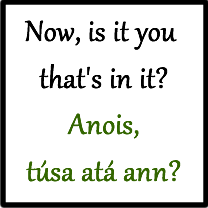
An interesting Hiberno-English expression I heard today is “Is it you that’s in it?”, which is a direct translation of the Irish “tusa atá ann?“, and is used as a greeting meaning something like, “Hello, how are you?”.
Another Hiberno-English expression that came up in conversation this morning was “Don’t talk to me (about that)”, which is used when agreeing with someone. For example, if someone says to you, “It’s a terrible day today” (referring to the weather), you might reply “Don’t talk to me about that”, meaning something like “It is indeed”.
The word now, and the equivalent in Irish, anois, is also used a lot in Ireland, also well as meaning at this moment, it can be used to express dismay; disbelief; in pubs, shops and restaurants as a way to ask customers what they would like; and when delivering orders in pubs and restaurants – in a similar way to the German word bitte.
So, the Irish equivalent of “tell me about it” is “don’t tell me about it”. Not very surprising as both expressions are sarcastic.
The word used when delivering orders in restaurants is “please” in several languages, not only German.
In Finnish, we use both “Älä muuta sano” (Don’t say anything else) and “Sanopa muuta” (Say something else) to mean agreement. I have always found it hilarious. I myself use both of them without preference for one or the other.
An Irish relative of mine used to use “don’t talk to me!” as a general form of exclamation/emotion:
“How are you? ”
“don’t talk to me” (meaning usually something bad, which will then be recounted in further detail.
Further drama was elicited by repeating the phrase following on from above
“why what’s the matter?”
“don’t talk to me!”
I’m just wondering if I’ve heard something similar in Spanish “no me hables” (can any native Spanish confirm?)
I had not seen that connection between the use of “now” and the multipurpose “bitte” in German. It makes sense. Some situational examples I can think of include:
“Right, now” ~ as server/cashier turns to signal their readiness for you.
“There, now” ~ as you hand something to someone.
“Is that everything, now?” ~ as they check if you’re ready to get your items tallied up at the cash register.